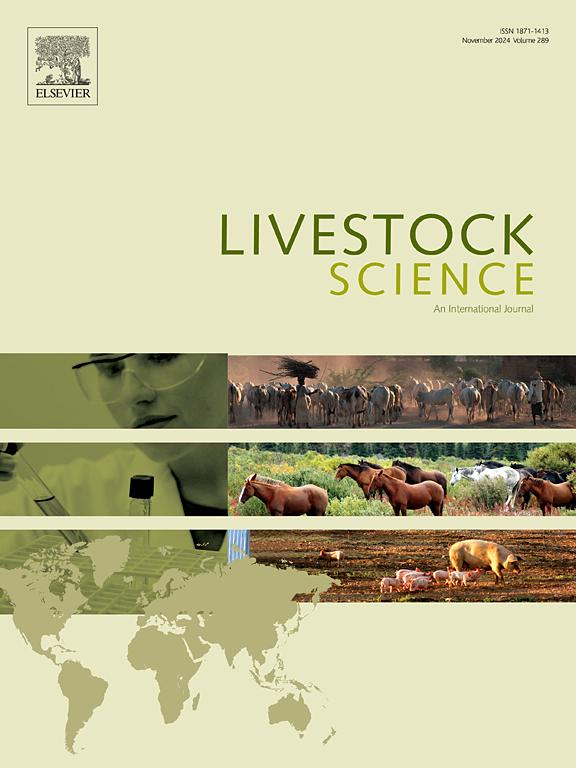Effects of cowpea protein hydrolysates on the growth performance, lipid profile, antioxidant status, tissue histomorphology, and expression of caspase-3 and tumor necrosis factor-α in broiler chickens
IF 1.9
3区 农林科学
Q2 AGRICULTURE, DAIRY & ANIMAL SCIENCE
引用次数: 0
Abstract
The impact of cowpea protein hydrolysate (CPH) dietary supplementation was assessed on the growth performance, blood hematology, liver histomorphology, antioxidant status, and inflammatory responses in broiler chickens. Five hundred 3-d-old broiler chickens (88.72 g ± 0.20) were assigned to 5 experimental treatments (10 replicates/treatment), the basal diet supplemented with 5 inclusion rates of CPH: 0, 2, 4, 6, or 8 g/kg. Throughout the experimental periods, broiler chickens fed diets supplemented with CPH showed no change in the growth rate. The 2 g CPH/kg treatment increased the red blood cell count, hemoglobin concentration, packed cell volume percentage, white blood cell count, and lymphocyte count (linear, P < 0.01; quadratic, P < 0.05). Uric acid concentration increased in the CPH-supplemented treatments (linear, P = 0.031). The inclusion of CPH reduced the total cholesterol (Linear, P = 0.03; quadratic, P = 0.02), the low-density lipoprotein concentrations (linear, P = 0.012), and the triglyceride concentrations (linear, P = 0.01). Dietary supplementation of CPH increased the total antioxidant capacity, catalase (linear, P < 0.001), and superoxide dismutase activity (linear, quadratic, P < 0.01). Supplementation of CPH showed a down-regulation of the expression of caspase-3 antibodies in the liver tissues (Linear, P < 0.01). Liver histoarchitecture was normal in all experimental treatments. It can be concluded that dietary cowpea protein hydrolysate can be used as a potential protein supplement in broiler chicken diets to improve antioxidant status and lower the blood lipids without affecting the broiler chickens’ growth rate.
豇豆蛋白水解物对肉鸡生长性能、脂质、抗氧化状态、组织形态学以及caspase-3和肿瘤坏死因子-α表达的影响
研究了饲粮中添加豇豆水解蛋白(CPH)对肉鸡生长性能、血液血液学、肝脏组织形态学、抗氧化能力和炎症反应的影响。试验选用3日龄肉鸡500只(88.72 g±0.20 g),分为5个试验处理(10个重复/处理),分别在基础饲粮中添加0、2、4、6、8 g/kg的CPH。在整个试验期间,饲粮中添加CPH对肉鸡的生长速率没有影响。2 g CPH/kg处理使红细胞计数、血红蛋白浓度、堆积细胞体积百分比、白细胞计数和淋巴细胞计数(线性,P <;0.01;二次的,P <;0.05)。尿酸浓度在cph补充组升高(线性,P = 0.031)。CPH降低了总胆固醇(线性,P = 0.03;二次型,P = 0.02),低密度脂蛋白浓度(线性,P = 0.012),甘油三酯浓度(线性,P = 0.01)。饲粮中添加CPH可提高总抗氧化能力、过氧化氢酶(线性,P <;0.001),超氧化物歧化酶活性(线性,二次,P <;0.01)。添加CPH可下调肝组织中caspase-3抗体的表达(Linear, P <;0.01)。各实验组肝脏组织结构均正常。由此可见,在不影响肉鸡生长速率的情况下,饲粮中添加豇豆蛋白水解物可作为肉鸡饲粮中潜在的蛋白质补充物,提高肉鸡抗氧化能力,降低血脂。
本文章由计算机程序翻译,如有差异,请以英文原文为准。
求助全文
约1分钟内获得全文
求助全文
来源期刊

Livestock Science
农林科学-奶制品与动物科学
CiteScore
4.30
自引率
5.60%
发文量
237
审稿时长
3 months
期刊介绍:
Livestock Science promotes the sound development of the livestock sector by publishing original, peer-reviewed research and review articles covering all aspects of this broad field. The journal welcomes submissions on the avant-garde areas of animal genetics, breeding, growth, reproduction, nutrition, physiology, and behaviour in addition to genetic resources, welfare, ethics, health, management and production systems. The high-quality content of this journal reflects the truly international nature of this broad area of research.
 求助内容:
求助内容: 应助结果提醒方式:
应助结果提醒方式:


